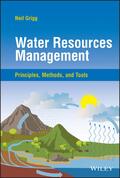Water Resources Management
Principles, Methods, and Tools

1. Auflage April 2023
400 Seiten, Hardcover
Lehrbuch
Water Resources Management
A thorough and authoritative handbook to the foundations of water resources management
In Water Resources Management: Principles, Methods, and Tools, distinguished engineer Dr. Neil S. Grigg delivers a comprehensive guide to the water resources industry, the technical methods and tools that professionals in that industry use, and the concepts and issues that animate the discipline. The author also provides expansive case studies that highlight real-world applications of the ideas discussed within.
The book offers practical content, including discussion questions, practice problems, and project examples, while presenting a cross-disciplinary perspective ideal for those studying to be civil or environmental engineers, urban planners, environmental scientists, or professionals in other disciplines.
Water Resources Management covers the foundational knowledge required by professionals working in the field alongside practical content that connects readers with how the discipline functions in the real world. It also includes:
* A thorough introduction to the framework of the water industry, including discussions of water resources and services for people and the environment
* In-depth explorations of technical methods and tools, including hydrology as the science of water accounting
* Fulsome discussions of water resources management concepts and issues, including models and data analytics to support decision-making
* Expansive treatments of water-related failures, accidents, and malevolent activity
Perfect for civil and environmental engineering students studying water resources planning and management, Water Resources Management: Principles, Methods, and Tools will also earn a place in the libraries of practicing engineers, government officials, and consultants working in water management and policy.
Preface ix
1 Water Resources Management 1
2 History of Water Resources Management 9
3 Water Infrastructure and Systems 25
4 Demands for Water and Water Infrastructure 45
5 Hydrologic Principles for Water Management 67
6 Water Balances as Tools for Management 89
7 Flood Studies: Hydrology, Hydraulics, and Damages 103
8 Water Quality, Public Health, and Environmental Integrity 119
9 Models and Data for Decision Making 133
10 Operations, Maintenance, and Asset Management 149
11 Water Governance and Institutions 165
12 Water Management Organizations 173
13 Planning Principles, Tools, and Applications 189
14 Planning for Water Infrastructure 203
15 Water Quality Planning and Management 211
16 Planning for Sociopolitical Goals 223
17 Environmental Planning and Assessment 235
18 Economics of Water Resources Management 241
19 Financing Water Systems and Programs 261
20 Water Laws, Conflicts, Litigation, and Regulation 289
21 Flooding, Stormwater, and Dam Safety: Risks and Laws 309
22 Water Security: Natural and Human-Caused Hazards 319
23 Integrated Water Resources Management 331
24 Careers in Water Resources Management 345
Appendices
Appendix A Units, Conversion Factors, and Water Properties 355
Appendix B Acronyms and Abbreviations 361
Appendix C Associations, Federal Agencies, and Other Stakeholders of the Water Industry 367
Appendix D Water Journals 373
Appendix E Glossary of Water Management Terms 377
Index 395


